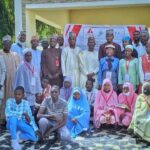The United Nations Children’s Fund (UNICEF) has said children in BAY (Borno, Adamawa, Yobe) states are battling escalating levels of malnutrition, and need immediate and holistic response to address it.
The UNICEF Chief of Field Office, Maiduguri Dr. Tushar Rane, stated this Tuesday in Maiduguri , Borno State during a child malnutrition media dialogue and capacity building for journalists, organised by UNICEF Nigeria Office, in collaboration with the Child Rights Information Bureau (CRIB) of the Federal Ministry of Information and Culture. It was part of activities to commemorate this year’s World Humanitarian Day.
He said , “As you are all aware, malnutrition is a present threat affecting children who are already dealing with multiple vulnerabilities.”
He said approximately 2.8 million children under five and pregnant and lactating women (PLWs) were in need of preventative nutrition services.
- Amnesty kicks as police arrest man after posting video of gov’s wife’s party
- NIGERIA DAILY: Real Reasons Nigerians Attack Security Agents
He warned that if not provided with quality preventative services, approximately 1.7 million boys, girls, women, and adolescents across the BAY states were likely to be affected by acute malnutrition during 2024.
He said 206,779 pregnant and lactating women were expected to suffer acute malnutrition.
Quoting the 2023 lean season Nutrition and Food Security Surveillance (NFSS) Round 13 conducted across the BAY states, he said the prevalence of global acute malnutrition (GAM) among children under 5 years in Borno is 10.2%, 8.0% in Yobe and 4.0% in Adamawa.
This also means that an estimated 511,807 children under five suffer from Sever Acute Malnutrition annually, requiring urgent interventions to save their lives.
Dr. Rane said nutrition programmes in the north east states were integrated within government health facilities where there are 765 outpatient treatment programme (OTP) sites in the BAY states providing treatment for children with SAM without medical complications, and 50 Stabilization Centers (SCs) treating SAM with medical complications.
Only 63% of the 714 wards in the BAY states provide nutrition services, he added.
He said with support from UNICEF and donors such as the United Kingdom Government (UKAid) and the German Ministry for Economic Cooperation and Development (BMZ), among other donors, government across the BAY states were currently supporting 4,383 child nutrition mobilisers (CNMs) supporting malnutrition screening at the community levels.
He said, “ The CNMs are an important link in the nutrition system. They reinforce nutrition best practices in the communities and, from house to house, they build the capacity of mothers to screen their children.
“With the collaborative efforts of government and all partners, over 460,000 children were treated for acute malnutrition across Borno, Adamawa and Yobe states, during 2023. That is 37 per cent increase over the coverage for same period in 2022.”

 Join Daily Trust WhatsApp Community For Quick Access To News and Happenings Around You.
Join Daily Trust WhatsApp Community For Quick Access To News and Happenings Around You.


